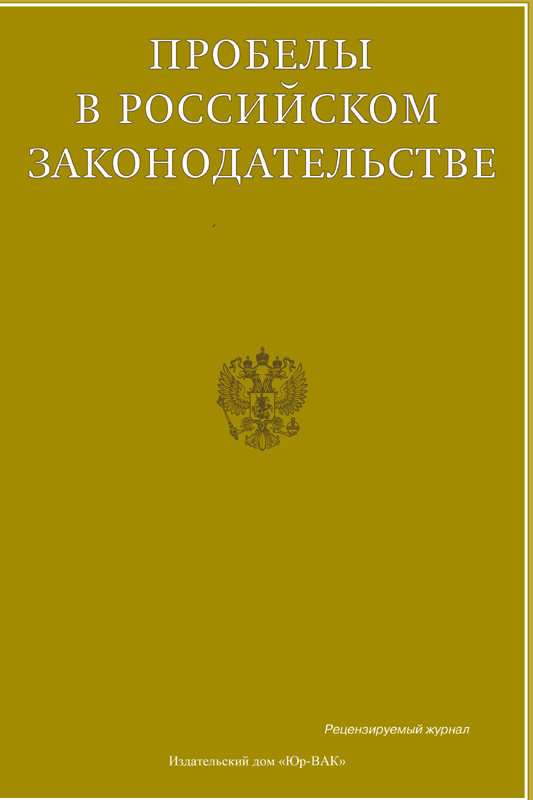The Evolution of Commune on the Example Tings, Veche, and Early Period of English Parliament
- Authors: Migunova T.L.1, Mineeva T.G.1, Tolstolutsky V.Y.1
-
Affiliations:
- Volga State University of Water Transport
- Issue: Vol 15, No 1 (2022)
- Pages: 163-170
- Section: Articles
- URL: https://journals.eco-vector.com/2072-3164/article/view/531622
- ID: 531622
Cite item
Abstract
Keywords
Full Text
About the authors
Tatiana Leonidovna Migunova
Volga State University of Water Transport
Email: tmigunova@mail.ru
Dr. Sci.(Law), Professor, The head of Theory and History of State and Law Department Nizhny Novgorod, Russia
Tatiana Germanovna Mineeva
Volga State University of Water Transport
Email: t.mineeva@yandex.ru
Dr. Sci.(Law), Professor of Theory and History of State and Law Department Nizhny Novgorod, Russia
Vladimir Yuryevich Tolstolutsky
Volga State University of Water Transport
Email: tolvlad@yandex.ru
Dr.Sci.(Medicine), Professor, Head of Criminal Law Disciplines Department Nizhny Novgorod, Russia
References
- Petrushevsky D.M. Essays from the history of the medieval state and society in the Middle Ages. Moscow: Yurayt. 2018. -372 p. (Series: Anthology of Thought)
- Jakson T.N. Icelandic royal sagas about Eastern Europe. Texts, translation, commentary. Moscow: Dmitry Pozharsky University. 2012. 779 p
- The law of Zealand/http://middelaldertekster.dk/eriks-lov/1/1 / Accessed 10.01.2022
- Danmarks gamle Love paa Nutidsdansk, ed. E. Kroman and S. Iuul , Danske Sprog- og Litteraturselskab, 3 vols (Copenhagen: G.E.C Gad, 1945-48)
- Agishev S.Yu. Appendix. The first edition of the Norwegian medieval laws. /Vox medii aevi. [First version]. 2015. No. 2-3 (13-14). pp.75-89.
- Gaius Julius Caesar. Notes on the Gallic War. Ch.23.
- Cornelius Tacitus. On the Origin and Situation of the Germans. Ch.11, 12.
- The Saga of the Faroese.II//Icelandic Sagas. Vol.2. M.: Languages of Slavic culture. 2004. - 608 p. p.143
- Froyanov I.Ya. Kievan Rus IX-XIII centuries. Popular movements. Princely and Veche power. Moscow: Russian Publishing Center. 2012. pp. 158-215
- A book about the settlement of Iceland.//Gurevich A.Ya. Colonization of Iceland. Scientific notes of the Kalinin State Pedagogical Institute, proceedings of the Department of History. 1963. Vol. 35.
- Tjønn H. Olav Trygvasson. Sagabok. - Spartacus Forlag AS. Oslo. 2012. 223 ss.
- Kongesagaer by Gustav Storm. Hardcover/ 1900. S.73/ https://archive.org/details/norgeskongesaga01bugggoog/page/n15/mode/2up
- Einhard. The Life of Charlemagne. Moscow: Institute of Philosophy, Theology and History of St. Thomas. 2005. 304 p. Chapter XIV. p.92
- Andersson I. Äldre demokratisk tradition i Norden/Nordisk Demokrati. S.9.
- Sølvará H.A. Færøernes statsretlige stilling i historisk belysning - mellem selvstyre og selvbestemmelse// Føroyskt Lógar Rit (Faroese Law Review) vol. 3 no. 3 - 2003. S.148
- Rafn, Carl Christian (red.) 1972 Færeyinga Saga eller Færøboernes Historie i den islandske grundtext med færøsk og dansk oversættelse. København 1972. S.19 https://books.google.ru/books?id=TbFr3a4_pNEC&pg=PA1&hl=ru&source=gbs_toc_r&cad=3#v=onepage&q&f=false дата обращения 7.01.2022
- Riess L. Geschichte des Wahlrechts zum engelischen Parlament im Mittelalter. BiblioBazaar. 2009 128 ss. S. 22-28
- McKisack M. The fourteenth century. 1307-1339. New Yokk: Oxford University. 1959. P. 190
- Mineeva T.G., Romanovskaya V.B. Parliament and royal power. England XIV - XV centuries. Lambert Academic Publishing. 2013
- Nordisk Demokrati./ Red. Hal Koch, Alf Ross., Oslo: Natur och Kultur, Stockholm: Wcstermann, København: Halvorsen & Larsen . 1949. 473 ss. S.VIII,IX.
- Yanin V.L., Aleshkovsky M.H. The origin of Novgorod: (To the formulation of the problem) // History of the USSR. 1971 No. 2. pp. 56-60.
- Martyshin O.V. Volny Novgorod: The socio-political system and the law of the feudal republic. - M.: Russian Law, 1992. 384 p.
- Lukin P.V. Veche in the socio-political system of medieval Novgorod/Abstract for the degree of Doctor of Historical Sciences. M. 2014. 50 p.
- Granberg Yu. Veche in Old Russian Written Sources: Functions and Terminology // The oldest states of Eastern Europe: Materials and Research 2004: Political Institutions of Ancient Russia / Ed. T.V. Gimon, E.A. Melnikova. - M.: Oriental Literature of the Russian Academy of Sciences, 2006. pp. 151-217
- Gorobenko A.T. The experience of the formation and development of democracy in the Novgorod Republic and Sweden of the XII-XIII centuries.//Bulletin of the University. Kutafina . 2018. No. 8. pp.134-138
Supplementary files









